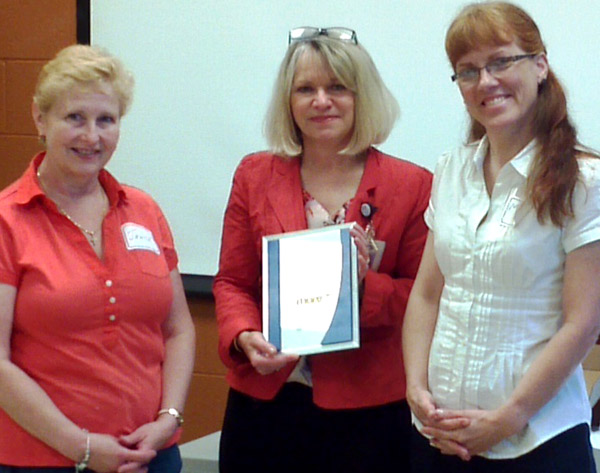Closure of maternity fails to support rural realities
Administrator | Jun 25, 2013 | Comments 4

Katherine Stansfield, QHC vice-president of patient care services (centre) presents an award for high completion rates in a ‘Managing Obstetric Risk Effectively’ three-year program, to Janice Heard, Picton obstetrical nurse, (at left) and Margaret Tromp, Picton family physician who does maternity care.
On the heels of Picton hospital losing its maternity ward, doctors and nurses completing two years of a three-year obstetric patient safety program received an award.
Janice Heard, Picton obstetrical nurse and Margaret Tromp, Picton family physician accepted the award last week from Katherine Stansfield, Quinte Health Care vice-president.
The honour is for high completion rates by the Picton and Belleville maternity providers, in the MORE (Managing Obstetric Risk Effectively) program started by the Society of Obstetricians and Gynecologists of Canada (SOGC).
QHC CEO Mary Clare Egberts last week reported to the PEC Healthcare Advisory Committee that a group of County physicians and nurses was formed to determine if there was a way to maintain the maternity services in Picton.
“Unfortunately, despite their efforts, the group was not able to come up with any solutions that we felt were relatively cost neutral and sustainable while maintaining the same quality of care,” Egberts told the committee, of which she is a member. “For example, we looked at the option of providing the necessary training for all of our Prince Edward County Memorial nurses but the low volume of births makes it difficult for newly trained nurses to maintain confidence in these skills over time.”
Three sources have confirmed there was no group of doctors and nurses who met regularly to consider options.
One meeting was called about two weeks before the announcement asking the doctors and nurses if they could think of any way to keep maternity that doesn’t cost any money and that is consistent with the unions and is consistent with all the SOGC guidelines.
The “group” noted it cannot run maternity if QHC won’t provide the nurses. The next the “group” heard was the morning of Friday, July 14, when services were officially taken away.
“This was a very difficult decision and we recognize it won’t be well received by the community,” Egberts read from a statement at the Shire Hall meeting. “The maternity service at PECMH has been a valued and respected part of the hospital for decades. Unfortunately, we can no longer provide consistent 24-hour coverage with nurses who have the specialized skills and training to provide obstetrical care.”
She was also asked to explain why five babies were taken by five ambulances to Kingston hospital earlier this month due to lack of services at Belleville hospital.
“We thought we were covered but at the last minute it turned out we were not,” Egberts said. “So for the safety of the babies, five babies were transferred to Kingston. I’m sorry to say it’s probably not the last time this is going to occur. We have a new pediatrician starting in July but it still is a large workload and we need to have five.”
Egberts said there is coverage for shifts in July and August and “we’re going to do our best to cover those but it is an ongoing struggle. There is a lack of pediatricians across the entire province. They are in great demand.”
In recommendations revised last fall by the Society of Obstetricians and Gynecologists of Canada (SOGC), “Registered nurses are essential to the provision of high-quality rural maternity care throughout pregnancy, birth and the postpartum period. Maternity nursing skills should be recognized as a fundamental part of generalist rural nursing skills.”
The recommendations were also approved by the Canadian Association of Midwives, the Canadian Association of Perinatal and Women’s Health Nurses, the College of Family Physicians of Canada and the Society of Rural Physicians of Canada.
“There is evidence that the outcomes are better when women do not have to travel far from their communities. Access to an integrated perinatal care system should be provided for all women.”
“When rural maternity services are lost, women are required to travel to ensure adequate access to maternity care providers and services. These women, who many need to leave their communities for a month or more, report financial, social and psychological consequences.”
Additional costs include travel, and loss of income if the partner wishes to be present at the birth and arrangements for other children who remain at home.
“Perhaps even more striking than the financial implications of having to travel to give birth are the social and psychological costs,” the report states. “Women report feelings of isolation, separation and social disruption during what should be a joyful period in their lives. They may be overwhelmed by the need to navigate resources unfamiliar to them, the pain of missing friends and family members who could not be with them in the referral community…”
The report recommends that women who are required to leave their communities to give birth should be supported both financially and emotionally.
The report also states rural specialists report a high level of satisfaction with the support they receive locally… but “Rural maternity care teams need to be supported by consulting urban specialists who are responsive and respectful and who understand the rural reality.”
The report concludes that current health care policy does not adequately support rural nurses, doctors, and midwives to meet the needs of rural women and new approaches are needed to support collaborative, integrated and safe care for mothers and newborns in rural Canada.
Meanwhile, Patrons of Our County Hospital (POOCH) will be meeting with Quinte West Mayor John Williams and his group this week. Quinte West also wants to leave the Quinte Health Care Corporation.
Wolf Braun, POOCH representative said a representative from the Ontario liberal party is to provide insight on how best to engage the premier.
“POOCH will also be reaching out to some 20-30 small rural hospitals who have the same goal as we have,” said Braun. “Plans are under way to get the premier’s attention.”
Filed Under: Local News
About the Author:
































they can come up with all excuses they want..Its just another thing being shut down at the hospital………….anyhow…Pregnant women are STILL going to show up in the ER….because they can not make the drive up to belleville…….
You can not tell Baby to wait!….
Probably babies being born on hwy 62.
and im sure many woman will be calling ambulances to take them to belleville ……..therefore its costing money for the ambulances. taking away from emergency patients.
I for one, would NOT arrive in belleville emerg to have baby…
Im happy my baby born at PIcton hospital.and received WONDERFUL care.
and they were very knowledgable.
sad
my 2 cents
RURAL HEALTH IS DIFFERENT (from the Society of Rural Physicians of Canada)
Our rural hospital is a unique institution. It is not merely a scaled down version of a city hospital. It needs to be staffed by generalist physicians who provide a broad spectrum of care. Maternity care has been found to be as safe in smaller rural hospitals as in large specialist run centres in Ontario.
American studies show that if women have to travel to give birth, costs are higher and results worse. Due to the evidence of safer local access 3 large medical organizations joined in issuing a statement on the need for rural maternity care in Canada with and without local caesarean capability.
Yet, despite what Canada’s doctors state as fact, QHC in their alternate reality state, simply chugs along chopping basic rural services without input from PEC residents.
There are several basic services that for population safety and access need to be as close as possible to where people live and work. By analogy it doesn’t matter that fire halls are inefficient as the vast majority of the time there is no fire to fight. That service is none the less needed in a timely fashion. Similarly basic medical care is needed close to the patient.
Well since BGH has inherited that large amount of money, I am sure that Ms. Egberts will be more than willing to share with the other hospitals within QHC….. ya, right! Wha is QHC’s belongs to BGH’s and no one else’s!
When CEO Mary Clare, Chair Brian Smith and the QHC Board closed the Maternity ward they must not have received the memo from VP Katherine Stansfield stating that the PECMH doctors and nurses received an award for high completion rates in the MORE(Managing Obstretic Risk Efficency) Program. Interesting!!!